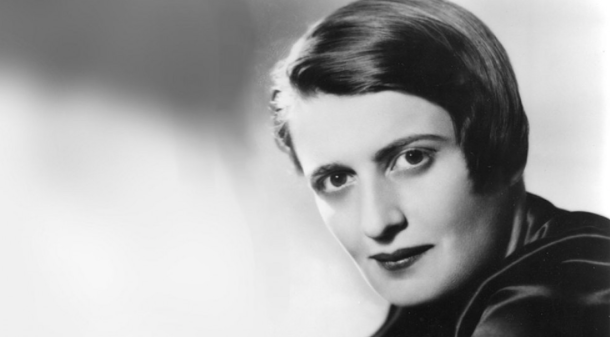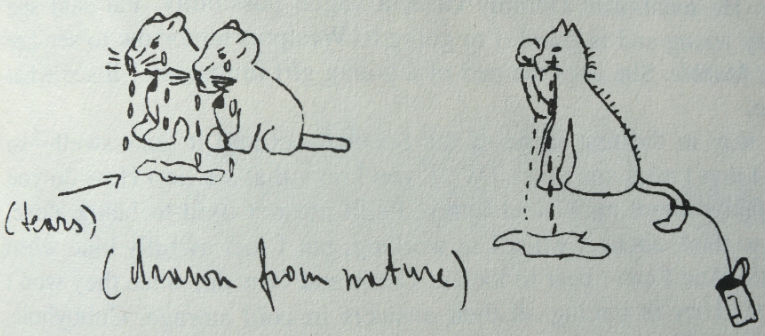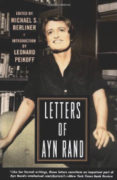
Whether you agree with Ayn Rand’s philosophical views or not, it can’t be denied that she was an intriguing individual. Her polemical style and her contemptuous tone will either move you to raise an eyebrow or force a smirk.
Rand’s philosophical system of Objectivism has certainly met mixed reviews ranging from ‘life-changing’ to ‘ridiculous’.
Leaving her Objectivism aside, it is clear that Rand was a highly intelligent, serious, and dedicated individual with a very strong work ethic. In fact, it could be argued that she was more committed to work than anything else. She once said:
The question isn’t who is going to let me; it’s who’s going to stop me.
But what about the personal side of Ayn Rand? Was there one? She was asked more than once in interviews if she even had thoughts about love or friendship (which, of course, she did). Her callous demeanor made it difficult for anyone to see a softer side.
We get a unique and enlightened view of Rand’s thoughts in the Letters of Ayn Rand. Reading her letters, it is clear that she was all of the characteristics listed above – intelligent, serious, dedicated – and more. However, there are rare instances where we can catch a glimpse of a different, softer side of Rand, that may surprise many.
Ayn Rand (Alisa Zinov’yevna Rosenbaum) came to America from Soviet Russia in February 1926. She stayed in Chicago with relatives for six months before heading to Hollywood – she wanted to be famous.
Before she left, she wrote to a friend back home in Russia by the name of Lyolya. It is the earliest discovered letter found from Rand.
Her excitement and awe about being in America are almost tangible.
August 28, 1926
Hello [written in English] Lyolya,
There was a time when I loved that American expression of yours [referring to “hello”], and now I am using it myself, because they don’t have any other expression here. Thank you for your letter. Though a little late, I am fulfilling my promise to you. You said you wanted to have an American to correspond with. I am writing to you as a real “American resident.”
I am so Americanized that I can walk in the streets without raising my head to look at the skyscrapers; I sit in a restaurant on very high chairs like in futuristic movie sets and use a straw to sip “fruit cocktails,”… I have learned to cross the street without getting hit by a car, while traffic cops yell “come on, girl” to me.
Not taking anything too seriously is the chief rule Americans adhere to. Everybody makes fun of everybody else, not maliciously, but very wittily, and that is the essence of America. The language here is not English at all, and is all “jokes” and “wisecracks” as they are called here.
As you can see, not only have I reached Riga, [many family members expected her to abort her trip and return to Russia] I reached further still. The only thing that remains for me is to rise, which I am doing with my characteristic straight-line decisiveness. I hope you will be impressed once more when you hear that I didn’t back down from a much harder path. I heard you were told that I returned. I am getting used to America. I had gotten used to all kinds of adventures even before I got to Riga.
Even though I speak English now and even think in English, I would be very happy to have “a Russian to correspond with,” if you want to write to the faraway city of Chicago. Regarding your coming to Chicago, I will meet you at the train station, even if you arrive in 1947; even if I am by then the greatest star in Hollywood; I just hope you have nothing against photographers and reporters following me and all my friends around, as is customary with stars – at least I hope that will be the case. But since it will be a long time until that happens, I will be very happy to have “a Russian to correspond with.”
Here, Rand is playful and even friendly. However, even at this very young age (21 years), she is still dedicated to achieving not only success but fame in America. She certainly did just that.
Almost 10 years later, Rand writes a love letter to her husband Frank O’Connor.
August 19, 1936
Cubby Sweet!
Well, here is the first lover letter I ever had a chance to write. And I have nothing to say, except that I miss you terribly. As a matter of fact, I don’t really miss you, it’s the funniest feeling: on the one hand, I feel so blue and I could cry any minute, and on the other hand I feel very proud and virtuous that I’ve actually done it: Let you go away and stayed on to do “my duty.”
The worst thing was coming home from the station. It was terrible and I enjoyed it, because it was a completely new feeling, something I’ve never felt before: the whole city seemed empty, and that’s not such a cliché as it sounds, it was the certainty that no one, not anywhere, on any street, really mattered to me. I felt free and bitter and I wanted to cry.
I didn’t look back at your train once. How did you feel?
Here it seems she is being loving, but clearly has no problem with independence at the same time.
She continues:
Tweetness, I miss you! This is fun, writing to you, but it seems silly and unreal. I’m waiting for your letter to see how you do it. I am a poor little feline with a can tied to my tail. And my tail is down, and my fur up, and I’m a Siberian blue “kittan.” Oscar and Oswald are no help, they’re moping about and won’t talk to me.
Do I have to tell you that I love you?
Who are Oscar and Oswald? They are stuffed lion cubs, of course. One of the earliest gifts Rand received from Frank O’Connor was 2 small, stuffed lion cubs. She called them Oscar and Oswald and they served as symbols to Rand and O’Connor of a ‘benevolent universe.’
Sometimes the cubs were even dressed in colorful hats and bows for holidays and other celebrations.
What’s more fun? Rand drew a picture of the ‘moping’ cubs missing Frank. She also drew a picture of herself as a feline with a can tied to her tail – and her fur up.

She closes her letter,
Good night, Tweet!
XXXXXXX
Your
Fluff
Evidence of a loving, playful, even silly side of Ayn Rand. It’s clear how she loves Frank O’Connor, as she displays her comfort using pet names and referencing anthropomorphized stuffed toys.
It is indeed refreshing to see a different side of this very serious and stern philosopher.
Letters of Ayn Rand is a unique peek into the life of this elusive philosopher. Check out the book here.
Or check out Atlas Shrugged and The Fountainhead, her 2 most famous philosophical fiction books below.
Explore other philosophers here.

Leave a Reply